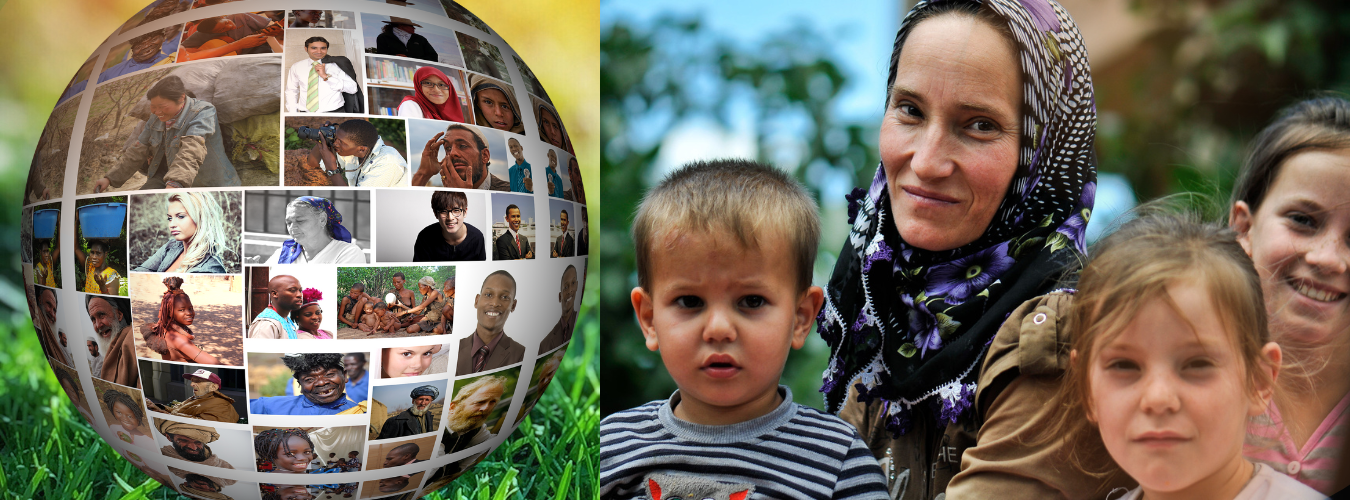2023 Theme: Demographic Trends and Families
In late 2022, the world’s population has reached eight billion people. Characterised by the United Nations Secretary-General as a ‘milestone in human development’ this landmark event illustrates major advancements in health extending human lifespans. Population growth is to continue albeit at a decreasing rate. It is projected to reach 9.8 billion in 2050 and 11.2 in 2100 rising concerns about the prospects of sustainable urbanization and management of climate change.
Demographic change is one of the most important megatrends impacting our world and the life and well-being of families worldwide. Demographic trends are mostly shaped by fertility and mortality patterns. Declining fertility rates result in benefits for families as they are more able to invest in their children’s health and education which in turns helps with poverty reduction and better socio-economic development.
Research indicates that decreasing fertility also increases women’s labour participation. On the other hand, fertility declines results in smaller families which are less likely to cope with care and other household obligations. As such in time of unemployment or illness, families have fewer members to rely on. Moreover, low fertility rates may undermine labour forces and social structures triggering drastic responses with hard to predict consequences for issues raging from social security to gender equality.
The 2023 International Day of Families observance is to raise awareness of the impact of demographic trends on families. The event will include:
- Launch of the Background Paper on “The Impact of Demographic Trends on Families”
- Presentation of the World Social Report 2023 “Leaving No One Behind in an Ageing World”
- Presentation on intergenerational equity and solidarity
- An overview of recommendations of policies in response to demographic trends Presentation of civil society initiatives for IYF+30
- Interactive discussion with audience participation
The impact of demographic trends
As part of the preparations for the thirtieth anniversary of the International Year of the Family, 2024 (IYF+30), the 2023 in-person observance of the International Day of Families focuses on the megatrend of demographic change and its impact on families. The event is to share current knowledge on demographic trends, including ageing and intergenerational solidarity; facilitate the analysis of their impacts on family life and recommend responsive family-oriented policies to respond to the needs of families around the world.
Background
During the 1980's, the United Nations began focusing attention on issues related to the family. In 1983, based on the recommendations of the Economic and Social Council, the Commission for Social Development in its resolution on the Role of the family in the development process (1983/23) requested the Secretary-General to enhance awareness among decision makers and the public of the problems and needs of the family, as well as of effective ways of meeting those needs.
In its resolution 1985/29 of 29 May 1985, the Council invited the General Assembly to consider the possibility of including in the provisional agenda of its forty-first session an item entitled “Families in the development process”, with a view to consider a request to the Secretary-General to initiate a process of development of global awareness of the issues involved, directed towards Governments, intergovernmental and non-governmental organizations and public opinion.
Later, based on the recommendations of the Commission for Social Development, formulated in its 30th round of sessions, The Assembly invited all States to make their views known concerning the possible proclamation of an international year of the family and to offer their comments and proposals.
The Council also requested the Secretary-General to submit to the General Assembly at its forty-third session a comprehensive report, based on the comments and proposals of Member States on the possible proclamation of such a year and other ways and means to improve the position and well-being of the family and intensify international co-operation as part of global efforts to advance social progress and development.
In its resolution 44/82 of 9 December 1989, The General Assembly proclaimed The International Year of the Family.
In 1993, the General Assembly decided in a resolution (A/RES/47/237) that 15 May of every year should be observed as The International Day of Families. This day provides an opportunity to promote awareness of issues relating to families and to increase the knowledge of the social, economic and demographic processes affecting families.
On 25 September 2015, the 193 member states of the United Nations unanimously adopted the Sustainable Development Goals, a set of 17 goals aiming to eliminate poverty, discrimination, abuse and preventable deaths, address environmental destruction, and usher in an era of development for all people, everywhere. Families and family-oriented policies and programmes are vital for the achievement of many of these goals.
Did you know?
- The global life expectancy at birth reached 72.8 years in 2019, an improvement of around 9 years since 1990.
- By 2030 nearly 12 per cent of the world population will be 65 years of age or older. By 2050 an average longevity globally is to reach around 77.2 years of age.
- Globally, over 23% of individuals, equating to over 1 billion people, live in slums in urban areas. Estimates show that growth of 1% in an urban population increases the incidence of slums by 5.3% in A sia and 2.3% in Africa.
- An estimated 2% of the global population is homeless and an additional 20 per cent live in inadequate housing.
Documents & publications
- UN Reports and Resolutions on Family
- Workplace Solutions For Childcare
- Reconciling Work And Family Responsibilities. Practical Ideas From Global Experience





